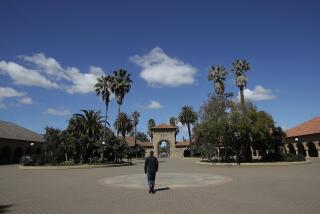Feeling at Home at Boalt Hall, Not at Harvard
Over the years, a number of justifications have been advanced in defense of the use of affirmative action policies in college admissions. To me, the latest one seems particularly suspect.
This year, UC Berkeleyâs Boalt Hall School of Law, operating without affirmative action policies, admitted 860 students, including 122 Asian Americans, 46 Latinos, 15 African Americans and two Native Americans. Of these 185 minority students, only 38 Asian Americans, 14 Latinos and 1 African American chose to enroll. I am proud to be one of them.
Supporters of affirmative action statewide have made much of the fact that few of the minority students admitted this year to Boalt Hall chose to attend. Increasingly, supporters have begun to argue that affirmative action is necessary in order to create an academic environment that is more racially diverse, and, thus, more welcoming to minority students. Minority students who gain admission to more than one university or law school, the argument goes, will shun University of California campuses because they are not racially diverse. Instead, they will attend private out-of-state colleges and law schools with larger numbers of minority students, allegedly because they will feel more at home there.
The problem with this argument is that minority students from California likely wonât feel more at home at East Coast colleges than they would at a local UC campus. I am a Cuban American student from Orange County enrolled at Boalt Hall this fall as a first-year student. In many ways, I have traveled the path that supporters of affirmative action fear many Californians of color will travel. I am writing because my feelings and experiences could not be more opposite than those who support affirmative action.
In 1993, I graduated as valedictorian of El Modena High School in Orange, where I was a National Hispanic Scholar, a National Merit Scholar and a National Science Scholar. I then attended Harvard University on 28 private-sector scholarships, which covered almost all of my expenses. In 1996, I graduated from Harvard, magna cum laude, Phi Beta Kappa--earning my four-year college degree in just three years--in the top 5% of my class. I returned to California to work for state Senate Republican Whip Raymond N. Haynes in the Legislature for a year, and then attend Boalt Hall.
It was my undergraduate experience at Harvard that was a culturally alienating experience for me, not my current experience at Boalt Hall. Advocates of affirmative action should not fear that California minority students will flock to East Coast colleges because they will feel more at home there.
Columbia, Harvard and the like are nothing like California society. There is absolutely no economic diversity at these institutions, despite the cultural diversity produced by the affirmative action policies there. The truth is that diversity in the Ivy League is only skin deep. It was the sons and daughters of the most wealthy and privileged minorities who benefited most from affirmative action policies.
On the East Coast, the Latino and African American students that I met while at Harvard were almost all graduates of the major âprep schools.â Most Californians have never heard of these places, as I had never heard of them prior to enrolling at Harvard. Yet, that is where students of color at Harvard disproportionately came from, not Orange County, and certainly not South Central Los Angeles.
As social institutions, California schools are characterized by more upward social mobility than any Columbia or Harvard on the East Coast. The parents of an average student at Boalt are more likely to âwork for a livingâ than the parents of minority students at Harvard, who seemed to uniformly be in the business of managing capital, owning capital, or assessing risk.
As the son of Cuban immigrants who became public school teachers, I found out that I had very little in common with minority students from the East Coast who were the sons and daughters of the economic elite. And contrary to the fears (or hopes) of the affirmative action-pushers, I certainly didnât feel at home there.
Where I do feel at home is at a Boalt Hall, which lacks affirmative action.
The late Rev. Martin Luther King Jr. urged people to judge each other by the content of their character, not the color of their skin. At Boalt Hall, one sees and meets the result of an admissions policy that follows Dr. Kingâs words: a student body rich in character, if not in color.
More to Read
Sign up for Essential California
The most important California stories and recommendations in your inbox every morning.
You may occasionally receive promotional content from the Los Angeles Times.










